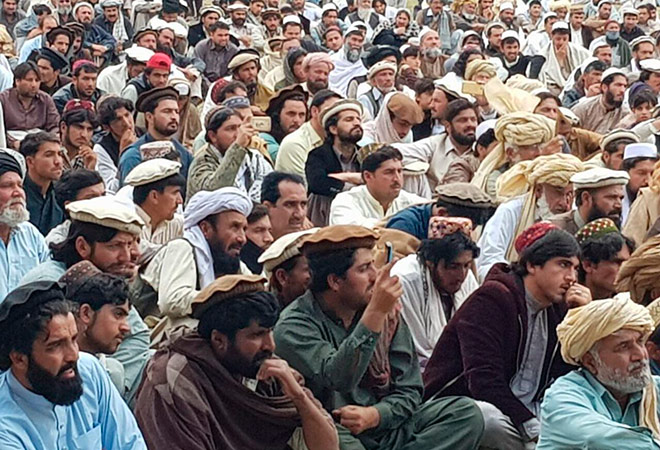On 16 April, the border areas of Afghanistan (in Khost and Kunar provinces) were struck by deadly strikes that killed and injured over 30 people. The official details are yet to emerge but the attacks have left women and children dead. The airstrikes come amidst rising attacks by the Tehreek e Taliban (TTP) on the Pakistan Army, police and the paramilitary forces after the American withdrawal. It should be remembered that Pashtun activists had voiced similar concerns during the US-Taliban negotiations. Despite the Taliban’s repeated assurances that the Afghan soil would not be used for anti-Pakistan activities, aggressive posturing by the TTP points to the former’s unwillingness to restrain the group, leaving the Pashtun community at the receiving end of authorities as well as the TTP. As attacks from the TTP have risen manifold, the political activists and human rights activists in the Pashtun belt have come under greater scrutiny for harbouring critical views on Pakistan’s neighbourhood policy over the last four decades. The damage inflicted on the community in the name of the War on Terror is evident from the fact that it took almost two decades for the Pashtuns to articulate their collective voice through PTM. Even though the movement conducts itself within the boundaries the Pakistani constitution, its activists are tried under treason laws. In the last few years, Pakistan’s Finance Ministry has diligently documented the losses to the country due to the War on Terror. This is welcome but the deliberate emphasis on hard empirical data fails to incorporate the human costs of displacement that the community experienced at the hands of state and anti-state elements. The PTM has been protesting for four years against injustice, extremism, breeding of terrorists, terrorism and enforced disappearances. The PTM is calling for a truth commission on the War on Terror. The movement has repeatedly demanded revocation of certain provisions that accord extrajudicial and arbitrary powers (Sections Three and Six of Maintenance of Public Order and Schedule Four of Anti-Terrorism Act) to the civil-military apparatus in the border areas. So far, hundreds of cases have been filed against PTM activists, their family members and associates. Most of them are out on bail and appearing in courts and most of them are still lodged in different jails in Pakistan. This includes PTM central leader and National Assembly member Ali Wazir, Hanif Pashteen, Owais Abdal and Qazi Tahir. Qazi Tahir, who was recently sentenced to life by an Anti-Terror Court in Karachi was not even present in the protest he has been accused of being part of. Clear evidence of this was presented in court. PTM central leader Zubair Shah Agha was harassed by senior officials and agencies in Khuzdar when he appeared for a law examination. Deputy Commissioner Khuzdar was present at the examination venue to scrutinize him personally and even took hundreds of pictures of him without giving any explanation. The officials coerced the examination superintendent and other staff to cancel Zubair Shah Agha’s law exams. Refusing to file a case, the examination staff stated that Zubair Shah Agha undertook the exams by the law and did not commit any illegal acts. Agha has been fighting for human rights violations and the recovery of missing persons for years, emerging as a recognized voice. As a result of this struggle, the state registered dozens of cases against Zubair Shah Agha and he was arrested and tortured several times. PTM Mardan leader Sabir Bilal is a businessman and as a member of PTM’s core committee, attempts are being made to harm Sabir Bilal’s business. Sabir Bilal and his family have been running their clothing business. Threats were issued to Sabir Bilal calling upon him to either disassociate from the PTM or close the shops immediately. Another leader Idris Bacha is being harassed in various ways by state institutions. Bacha’s wife, who is attached to the health department, works at a government hospital in her village. She was transferred to another area far away from her village. Bacha was told that he could not leave his district without the permission of the district administration. PTM Dera Ismail Khan leader Shahid Sharani’s name too found its way into the fourth schedule and he has also been banned from leaving the district. Ali Wazir, a member of the National Assembly and currently imprisoned in the Karachi Jail was asked to soften his views on state policy on tribal areas. Given the losses suffered by Wazir’s family and his background as a grassroots leader, Ali Wazir maintains his stance even if it means continued incarceration. At present, the Pashtun community faces challenges on both sides of the border. Neither the victory of the Taliban was able to rein in the TTP, nor there is any respite from the militarization of the tribal hinterland. Understandably, the international community finds it challenging to act beyond the normative frameworks, it is proposed that the United Nations needs to establish some monitoring mechanism to check the Human Rights situation in the Af-Pak belt.


Being a pashtun, I agreed with you. But the problem with our community since the days of the moghal rule is that a section of it has always supported those in the power. It also happened when the Britishers were ruling India before partition. Same is the case with the Pakistani state. Thanks